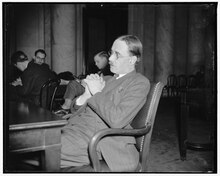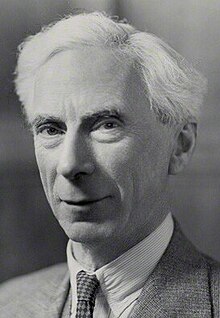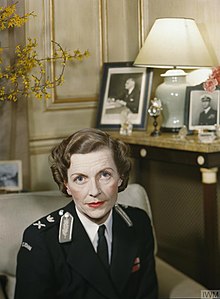

The India League was an England-based organisation established by Krishna Menon in 1928. It campaigned for the full independence and self-governance of British India. It has been described as "the principal organisation promoting Indian nationalism in pre-war Britain".
History
The India League emerged from the Commonwealth of India League, which was established in 1922 and itself emerged from the Home Rule for India League, established in 1916. When Menon became joint secretary of the Commonwealth of India League, he rejected its previous objective of dominion status for India and instead set the goal of full independence. During the 1930s, the organisation expanded and established branches in cities across Britain.
In 1930s, Menon along with other contributors had created a 554-page report on the situation in India. The report was banned in India. In 1931, Mahatma Gandhi praised the efforts of the Indian League for its "hurricane propaganda on the danger to world peace of a rebellious India in bondage".
Members of the League were largely drawn from the British elite, such as Edwina Mountbatten, Countess Mountbatten of Burma, Bertrand Russell, Harold Laski, Sir Stafford Cripps, Henry Brailsford, Leonard Matters, and Michael Foot, although a branch was established in the East End of London in the early 1940s, in order to attract more supporters from the South Asian community there. According to historian Nicholas Owen, British audiences were reluctant to believe accounts of colonial repression and social conditions in India given by Indians, and so the League sent a British delegation to India to validate its arguments, resulting in the publication in 1933 of The Condition of India.
In 1944, Menon reported that total membership of the league stood approximately at 1,400 members, and that 70 trade and 118 unions and other organisations are affiliated with the league.
The organisation continued to operate after India's independence in 1947 and while it focused mainly on India, "the League was internationalist in its outlook throughout, perceiving India's struggle for freedom as part of a larger struggle against imperialism and capitalism". Following Indian independence, the organisation focused on fostering relations between the UK and India and supporting Indian immigrants in the UK. It held regular meetings at the India Club, London. Latterly, its public presence faded.
In 1947 it was reported that the minimum subscription to the India League was five shillings. Branches could be established by groups of five or more people, subject to the approval of the League's executive committee. Branches were required to pay £2 6 shillings per year to the executive committee.

Other Members
- Aneurin Bevan
- Fenner Brockway
- H.N. Brailsford
- Leonard Matters
- Ellen Wilkinson
- Monica Whately
- Bhicoo Batlivala
- Shyamji Krishna Varma
- Bhikaiji Cama
- Harold Laski
References
- Ramesh, Jairam (2019). A chequered brilliance : the many lives of V.K. Krishna Menon. Haryana, India: Viking by Penguin Random House India. ISBN 978-0-670-09232-1. OCLC 1138886625.
- Nasta, Susheila (2013). India in Britain : South Asian networks and connections, 1858-1950. New York: Palgrave Macmillan. ISBN 978-0-230-39271-7. OCLC 802321049.
- ^ Nasta, Susheila. "The India League". Open University.
- McGarr, Paul M. (2011). ""India's Rasputin"? V. K. Krishna Menon and Anglo–American Misperceptions of Indian Foreign Policymaking, 1947–1964". Diplomacy & Statecraft. 22 (2): 239–260. doi:10.1080/09592296.2011.576536. S2CID 154740401.
- Rana, K.S. (2022). Churchill and India: Manipulation or Betrayal?. Taylor & Francis. p. 65. ISBN 978-1-000-72827-9.
- Kiran, R.N.; Mahadevan, K. (2000). V.K. Krishna Menon, Man of the Century. B.R. Publishing Corporation. pp. 5–6. ISBN 978-81-7646-145-0.
- Owen, Nicholas (2012). ""Facts Are Sacred": The Manchester Guardian and Colonial Violence, 1930–1932". The Journal of Modern History. 84 (3): 643–678. doi:10.1086/666052. S2CID 147411268.
- Volckmann, R.W. (1963). Krishna Menon: a Political Biography. University of California. p. 26.
- Sherwood, Harriet (9 August 2020). "From resisting the Raj to helping with Covid: India League reborn for the 21st century". The Guardian. Retrieved 20 March 2023.
- "Associations in foreign countries interested in India: The India League, London". India Quarterly. 3 (1): 86. 1947. JSTOR 45067427.
Further reading
- Barot, Rohit, Bristol and the Indian Independence Movement (Bristol Historical Association pamphlets, no. 70, 1988), 19 pp.
- McGarr, Paul M. (2010). "'A Serious Menace to Security': British Intelligence, V. K. Krishna Menon and the Indian High Commission in London, 1947–52" (PDF). The Journal of Imperial and Commonwealth History. 38 (3): 441–469. doi:10.1080/03086534.2010.503397. S2CID 159690638.
- Meston (1 September 1934). "Condition of India: Being the Report of the Delegation sent to India by the India League Delegation". International Affairs. 13 (5, September-October 1934). London: Essential News: 711–712.
- Moscovitch, Brant (2020). "'Against the Biggest Buccaneering Enterprise in Living History': Krishna Menon and the Colonial Response to International Crisis". South Asian Review. 41 (3–4): 243–254. doi:10.1080/02759527.2020.1798196. S2CID 225418610.
- Sadasivan, C. (1987). "The Nehru‐Menon partnership". The Round Table. 76 (301): 59–63. doi:10.1080/00358538708453792.